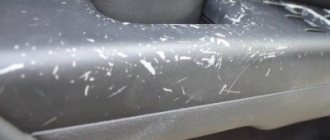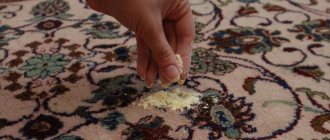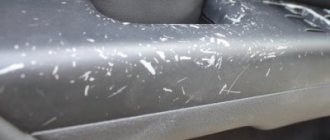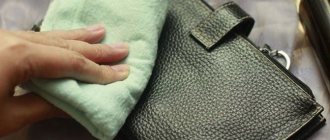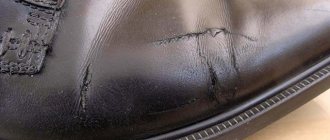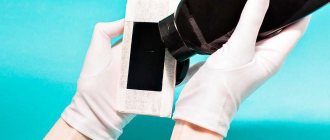Everyone has sunglasses or vision-correcting glasses.
But, unfortunately, even with careful handling, over time the lenses become covered with small scratches. Scuffs not only spoil the appearance of the accessory, but also negatively affect vision.
When you don’t have the time or money to replace scratched lenses, you can solve the problem yourself by using numerous products for removing scratches from glasses.
We will tell you more about how and what you can use to remove scratches from glasses glasses in this article.
Is it possible to remove the damage?
You can remove shallow scratches from glasses using the polishing method . If the scratches are deep, only grinding (cleaning glass using fine abrasive compounds) will help eliminate the defect.
It is important to remember that not all lenses can be restored. Thus, corrective glasses with diopters or lenses with a special darkening, anti-reflective or mirror coating cannot be polished or ground.
Cleaning will cause the lens to lose its properties and the protective coating to disappear. Such glasses can only be replaced with new ones.
How to polish polarized glasses?
Sunglasses are the easiest to scratch: they are often worn on vacation, on the beaches, or taken with them on vacation. When a person is relaxed, the last thing you want to think about is safety measures. Carelessness during operation leads to poor visibility. Damage is repaired by polishing and filling irregularities. Suitable folk remedies: tooth powder, soda, furniture wax.
Toothpaste must be free of whitening additives and abrasive components, otherwise the lenses will suffer even more. It is also necessary to avoid contact with acids and ammonia compounds. Do not use alkali-based products. If the scratch is large, the lens will have to be changed, but it is better not to skimp on your health and buy new glasses.
How to clean glass lenses?
Polishing glass lenses on glasses is quite difficult. Not every composition can remove scratches from a hard glass surface.
When choosing a glass lens polisher, you should pay attention to the following compositions:
- paste GOI,
- furniture polish,
- toothpaste,
- baking soda.
Paste GOI
A universal polish for steel alloys, metal and plastic, ideal for removing scratches from glass.
Algorithm of actions:
- Using a microfiber cloth or piece of felt, apply a small amount of paste to the lens.
- Rub the paste into the glass with gentle, smooth movements (the procedure lasts at least half an hour).
Only GOI paste No. 1 and No. 2 (fine-grain composition) is suitable for removing scratches.
Polishing glasses with GOI paste - in the video:
Toothpaste
Using a gel-based, non-abrasive, non-whitening toothpaste, you can quickly cover up minor scratches on your glasses.
Algorithm of actions:
- a small amount of toothpaste is applied to the glass;
- using a soft, dry cloth, rub the paste over the surface of the lenses;
- With movements from side to side, the lenses are polished for one minute.
The paste is most effective for removing shallow, small scratches. For deep uneven areas, brushing with toothpaste will have to be repeated several times.
Only after making sure that the lenses are polished should the glasses be washed under running water and wiped dry with a microfiber cloth.
Polish
Furniture, plastic and glass polishes are ideal for quickly covering up scratches on eyeglass lenses. The polish fills scratches and prevents further cracking of the glass.
In order not to completely ruin the glasses, cleaning is carried out following the following algorithm:
- The glasses are thoroughly washed under running water using liquid soap.
- A drop of furniture polish is applied to the lens, after which they begin to rub it in using a microfiber cloth.
- At the end of polishing, wipe the glasses dry with a soft cloth.
To remove scratches from glass, you can only use polishes that contain wax.
Soda
Scratches on lenses can be removed with baking soda . To do this, dilute baking soda powder with water (2:1 ratio), apply the resulting product to a cotton pad and begin to gently rub the scratched glass in a circular motion. Excess soda paste is washed off with water, and the glasses are wiped dry with a microfiber cloth.
Top 3 special compounds
When available means do not lead to the desired result, special compounds will help remove scratches from glass.
Before work, it is very important to evaluate your strengths and think about whether it is rational to use professional products to restore the glass surface or whether it is easier to take the glasses to an optics workshop for restoration.
TOP 3 special products for removing scratches from glass:
Polish-cleaner “Doctor Wax”
Effectively cleans glass from dirt, eliminates microcracks and roughness . Creates a water-repellent layer on the treated surface. Does not change the optical properties of the lens. The average cost is 300 rubles. (500 ml bottle).
Polishing paste Glass Gloss
The improved composition of the paste with surfactants and macrolog helps to quickly and efficiently remove abrasions and minor scratches from lenses. Average cost - 3000 rubles. (capacity 250 ml).
Fluoropol K powder
Designed for high-speed optical processing . Before use, the powder is diluted with water to the consistency of thick sour cream. The average cost is 760 rubles. (per 100 g).
Before using any professional products, you must carefully study the composition and manufacturer’s recommendations for its use.
Use of mechanical means
You will need: a monitor cloth and an electric razor with a linear drive (Brown, Panasonic). The foil is removed from the razor. Then a small circle is cut out of the napkin.
It is advisable that it fits the razor blade in a double-folded state. The resulting circle must be placed on the blade and secured firmly with a silk thread.
Now you need to turn on the razor and start polishing your glasses. This must be done slowly and carefully so as not to damage the plastic surface even more. It only takes a few minutes of polishing (up to 5 minutes).
Large scratches can be removed with a sanding machine . A special felt circle is required, onto which a paste intended for polishing cars is applied. The machine should operate at medium speed. Press the lens against the circle and polish it. In this case, the entire surface must be treated, and not just the location of the defect.
When the scratch has almost disappeared, you should take another circle with GOI paste and continue polishing the lenses of the glasses until transparent. After this, take a cloth, apply a little vegetable oil to it and wipe the glasses lenses with this mixture on both sides. After finishing work, the lenses should be treated with warm soapy water.
How to get rid of marks on plastic?
There are a sufficient number of ways to polish lenses . The easiest way to remove small scratches is on glass made from optical polymer. This is a fairly plastic material that can be easily processed.
Wax
The best product for polishing plastic lenses is car wax (available at any auto store).
The steps are simple: a minimal amount of wax (a drop size no larger than a match head) is applied to the lens and rubbed in with gentle, smooth movements until the scratch disappears. Wax fills scratches, smoothes out deformed surfaces, preserving the thickness and optical properties of lenses.
Don't worry if you put more wax on your lens than required. Excess can be easily removed with a clean soft cloth.
Clear varnish
Clear varnish can remove scratches from plastic lenses . It, like car wax, fills all the unevenness, creating an even, transparent layer.
It is necessary to work with colorless varnish very carefully, with pinpoint precision (the composition dries very quickly).
To mask defects, use a wooden toothpick . It is dipped into a bottle of colorless varnish, and then the tip is drawn along the scratch on the lens.
It is necessary to use only high-quality, not thick varnish. Otherwise, the composition will harden until the scratch is completely filled.
CD Spray
A spray for restoring the surface of CD disks (sold at a computer hardware store or service centers) you quickly remove a network of shallow scratches on glasses
The steps are simple: apply a small amount of polish to the lens (a few drops are enough), and then wipe it with a soft microfiber cloth.
Differences in polishing small, deep, extensive scratches
The glasses are carefully inspected to determine the extent of damage. It's easy to remove tiny abrasions yourself using a soft polishing cloth. Soap or toothpaste will be good helpers. With regular sanding, minor scratches will quickly disappear.
In case of deep damage, more serious actions are required: it is necessary to remove the surface layer of glass. Here you cannot do without special equipment. The polishing method depends on the material used to make the glasses. It is much easier to remove scratches from plastic lenses than from glass ones.
Can I wear the accessory after removing scratches?
The opinion of ophthalmological specialists is clear - you can wear glasses for a minimum amount of time after removing scratches (until you purchase and install new lenses).
The thing is that glass polishing gives only a short-term effect. After cleaning, the lenses acquire a radiant gloss, but, unfortunately, lose their optical, antistatic and water-repellent properties.
Polishing disrupts the geometry of the refractive surface of the lens, which can lead to image distortion and, as a result, visual fatigue, headaches and even decreased vision.
Removing the top layer on sunglass lenses
An effective way to remove scratches of any depth from plastic glasses is to remove the top coating . In this case, at the end of the procedure, the lens acquires a smooth surface without flaws.
Initially, you should clean your sunglasses from dust and dirt - microcracks attract them to themselves like a magnet.
To remove the top layer, products with hydrofluoric acid . You must first remove the lenses from the frame. The required amount of the drug is applied to their surface, then placed for 1–2 minutes in a plastic container for chemical exposure. After time, rinse thoroughly with water.
Important! Hydrofluoric acid is highly toxic, so when working with it, you must take precautions and use personal protective equipment.
Along with the removal of the outer layer, all protective coatings are removed, which makes the glasses more vulnerable to external mechanical influences.
Contact a specialist
If you can remove minor roughness, abrasions and scratches yourself using traditional methods, then with the problem of deep scratches it is better to contact a specialist. Glass polishing services are provided by eyeglass repair specialists , who can easily be found in any optical shop.
The cost of work is determined individually in each case (the amount of payment depends on the complexity and volume of work, the type of glasses). On average, they can charge 400 rubles for polishing one lens.
Disadvantages of DIY Cleaning
Polishing your glasses yourself is undoubtedly beneficial, but there are also disadvantages. If you carry out the procedure incorrectly, you can damage the glass even more. In addition, only minor scratches can be sanded at home. If the damage to the lenses is too large, then it is better to trust the specialists.
Before you start polishing your glasses, you need to determine what they are made of. There is a possibility that the presented methods will not be suitable for certain materials. It is important to follow all recommendations from optical manufacturers. Typically, glasses come with detailed instructions on how to care for them.
Expensive optics usually last longer than cheap products. This is due to the high quality of the materials used.
Prevention measures
The following care and storage rules will help you avoid microcracks and scratches on your glasses lenses
Every day, the lenses are carefully wiped with special microfiber cloths (paper or fabric napkins, cotton pads can damage the glossy surface);- To store glasses, use cases made of thick plastic, upholstered inside with soft fabric or genuine leather (soft cases do not provide reliable protection for glasses);
- glasses are not a toy, the accessory should not be given to children;
- When removing glasses, place them on the table only with the lenses facing up (you cannot leave the accessory on an unstable, dirty, dusty surface);
- Before going to a sauna or bathhouse, be sure to take off your glasses (high temperatures have a negative effect even on high-quality lenses);
- When doing construction or repair work, glasses are protected with a special construction shield.
Applying a special protective coating to the lenses will significantly reduce the number of scratches and extend the life of the glasses.
Is it even possible to polish plastic?
Despite the quality, price and manufacturer of such lenses, with constant use they become worn out and scratched. To extend the life of the accessory, as well as improve its appearance, it is recommended to properly care for it, that is, polish it periodically.
Important! The procedure must be carried out using only those preparations that do not contain abrasive substances and will not have a dangerous effect on plastic glasses, damaging their surface.
Adviсe
polish the glass of your glasses so as not to completely ruin its surface :
- Before polishing glasses, glasses must be washed in warm water with the addition of liquid detergent.
- When rubbing glasses, it is very important not to overdo it (movements should be smooth and careful). Otherwise, strong friction and pressure will permanently deform the lens.
- Minor scratches that appear on the lenses can be removed using rubbing alcohol. It is enough to moisten a soft cloth with alcohol and wipe the surface of the glasses.
When choosing a method for cleaning glasses, it is important to correctly determine the material they are made of (glass or plastic). To do this, lightly tap the lens with a coin. A dull sound indicates that the lens is made of plastic, while a loud sound indicates that the lens is made of glass.
You can also focus on the weight of the glasses (glass lenses are much heavier than plastic ones).
If you are interested in how to remove small and deep scratches from various surfaces and objects, take a look at this section.
Polishing glass with shampoo or soap
Shampoo, soap, dish soap, and other similar household chemicals can be used to gently polish lenses. Each of them contains microparticles that polish glass.
To get rid of defects, lubricate the lenses with one of the products and remove any remaining residue with a soft cloth. There is no need to rinse the lenses of your glasses under water: you should resort to this method of removing residual product only if it is otherwise impossible to remove it without streaks.
